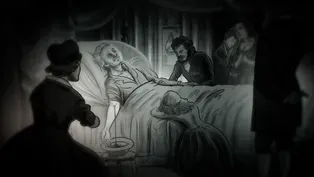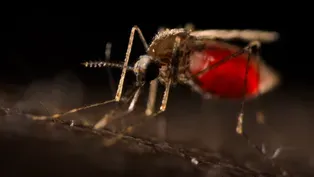
Inside the Fight To Develop a Malaria Vaccine
Clip: Season 50 Episode 17 | 4m 18sVideo has Closed Captions
These scientists were on the verge of a breakthrough with a promising vaccine nearing approval.
The World Health Organization approved anti-malaria vaccine, R-21, in 2023. Children in Ivory Coast were the first to receive the vaccine in July of 2024.
Problems with Closed Captions? Closed Captioning Feedback
Problems with Closed Captions? Closed Captioning Feedback
National Corporate funding for NOVA is provided by Carlisle Companies. Major funding for NOVA is provided by the NOVA Science Trust, the Corporation for Public Broadcasting, and PBS viewers.

Inside the Fight To Develop a Malaria Vaccine
Clip: Season 50 Episode 17 | 4m 18sVideo has Closed Captions
The World Health Organization approved anti-malaria vaccine, R-21, in 2023. Children in Ivory Coast were the first to receive the vaccine in July of 2024.
Problems with Closed Captions? Closed Captioning Feedback
How to Watch NOVA
NOVA is available to stream on pbs.org and the free PBS App, available on iPhone, Apple TV, Android TV, Android smartphones, Amazon Fire TV, Amazon Fire Tablet, Roku, Samsung Smart TV, and Vizio.
Buy Now

NOVA Labs
NOVA Labs is a free digital platform that engages teens and lifelong learners in games and interactives that foster authentic scientific exploration. Participants take part in real-world investigations by visualizing, analyzing, and playing with the same data that scientists use.Providing Support for PBS.org
Learn Moreabout PBS online sponsorship- [Narrator] The University of Oxford is home to one of the world's largest academic vaccine development programs.
In 2020, the University's Jenner Institute created the Oxford AstraZeneca COVID-19 vaccine.
And since then, 3 billion doses have reached 170 countries.
(gentle upbeat music) Adrian Hill and his colleagues have found malaria much more difficult.
- We've known for over 100 years, that it would be fantastic to have a malaria vaccine.
People have been trying for about 120 years, ever since the parasite was discovered.
I did a count about six months ago of how many vaccines had been made and gone into clinical trials for malaria, how many different ones, and that number was 142.
I'm not sure there's another disease where there've been that many vaccines that didn't work.
- [Narrator] Katie Ewer is the Lead Immunologist on the Oxford team.
- I think malaria is more personal for me because it's children.
I think you'd have to be a very hard-hearted person not to be moved by a death toll of 400,000 kids a year dying in Africa under the age of five from malaria.
It's a huge motivator to work on something where the chances of success are really, really small, but the rewards, if you do it, are enormous.
- [Narrator] For the last 13 years, the Oxford team has been working on a vaccine called R-21.
Its goal is to fire up the body's immune defenses to be ready to attack the parasite at its most vulnerable moment, just after it enters our blood.
But above all, they need to know if the vaccine protects enough children in the real world.
After around a year of closely monitoring the health of all 4800, Phase III children, the weight is nearly over.
- The key Phase III trial is coming to the end point.
The statisticians have the data and they are analyzing it as we speak.
- You know, this is something that we've all worked on for years, so to be this close, it's kind of nauseatingly, sickeningly, anxiety-inducing, really.
You know, we just don't know what we're gonna see and I think we'll be all really relieved to get that result.
- [Narrator] Eleven years after R-21 was first made here in the lab, after seven years of trials, over 20000 vaccinations, and hundreds of thousands of samples analyzed, an answer.
- [Adrian] Even about significance on severe malaria.
- [Katie] 72%, bloody hell.
- Well, why confidence intervals, but bloody hell, that's - Fucking brilliant.
- I mean that, yeah, absolutely.
Oh, God, get me a drink.
Yeah, so we have the result of the Phase III, so big moment, as expected from the Phase II.
So really interesting results in there.
But yeah, really good and really reassuring and yeah, just very happy.
(Katie laughing) (Katie crying) Yeah, we're very happy, although it probably doesn't look like it, but yeah, it's just a moment that we've been waiting for for so long.
But yeah, what we wanted and what we hoped for, so really good, yeah.
(gentle music)
Video has Closed Captions
Clip: S50 Ep17 | 2m 34s | Today, Malaria is considered a tropical disease, but it wasn’t always that way. (2m 34s)
Why Mosquitos Are Humanity’s Deadliest Creature
Video has Closed Captions
Clip: S50 Ep17 | 3m 37s | About 80% of deaths caused by Malaria annually are young children, below the age of five. (3m 37s)
Providing Support for PBS.org
Learn Moreabout PBS online sponsorshipSupport for PBS provided by:
National Corporate funding for NOVA is provided by Carlisle Companies. Major funding for NOVA is provided by the NOVA Science Trust, the Corporation for Public Broadcasting, and PBS viewers.














